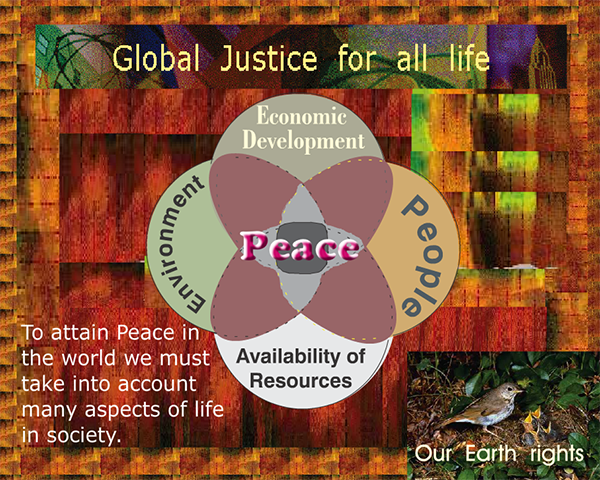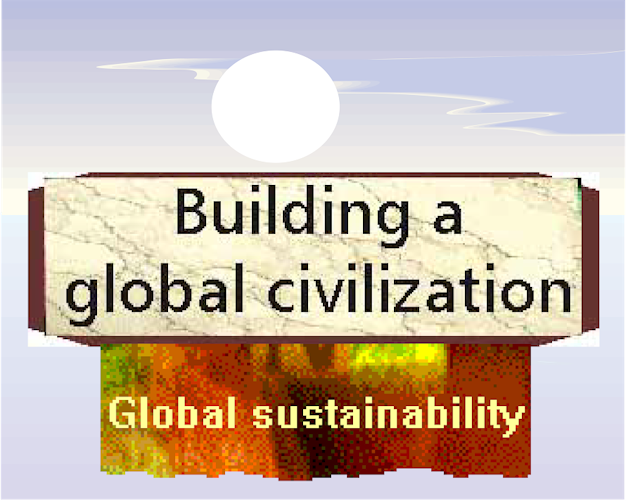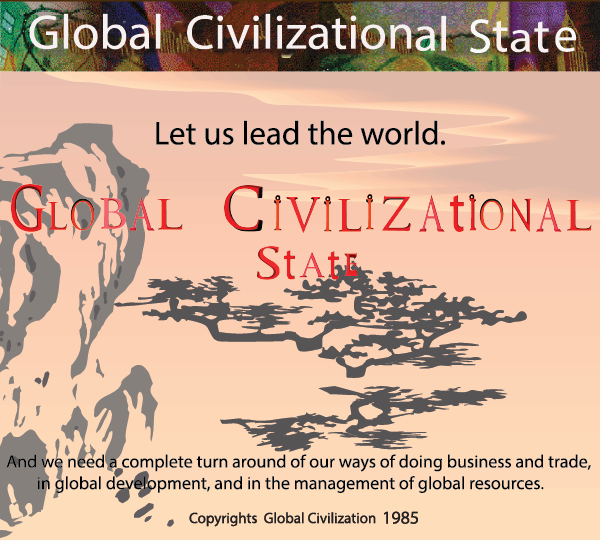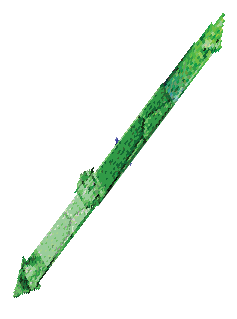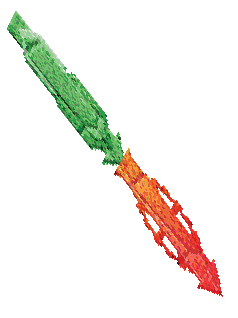
Global Dialogue 2024.
September 1st. 2023 to August 31st, 2024.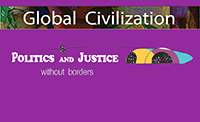
Click the image to watch the new promo movie.
 The House of Elected Representatives, the House of Advisers, and the Global Governments Federation together are the Global Parliament. The Peoples of the Global Community elect, nominate or appoint their representatives to Earth Government. The Global Parliament shall, jointly with the Earth Executive Council, enact legislation, and exercise the budgetary function, as well as functions of political control and consultation as laid down in the Global Constitution. The Global Parliament shall elect its President and its officers from among its members. The folowing are some of the sections related to the House of Advisers and copied from the Global Constitution.  Chapter 14.1 A) Global Parliament A.1 The House of Elected Representatives Article 1: The Global Parliament 1. The Global Parliament shall, jointly with the Earth Executive Council, enact legislation, and exercise the budgetary function, as well as functions of political control and consultation as laid down in the Constitution. Global Parliament shall elect the President of Earth Government. 2. The Global Parliament shall be elected by direct universal suffrage of all the Global Community citizens in free and secret ballot for a term of five years. Representation of the Global Community citizens shall be of one Elected Representative per million people. Sufficiently in advance of the Parliamentary elections, the Global Governments Federation shall adopt by unanimity, on the basis of a proposal from the Global Parliament and with its consent, a decision establishing the composition of Global Parliament, respecting the principles set out above. 3. The Global Parliament shall elect its President and its officers from among its members. Article 2: Composition of Global Parliament 1. The Global Parliament shall be composed of three bodies, designated as follows: the House of Elected Representatives, to represent the Global Community directly and equally; 2. The Global Governments Federation , to represent the nations of the world; 3. House of Advisers with particular functions to represent the highest good and best interests of humanity as a whole; and 4. All members of the Global Parliament, regardless of body, shall be designated as Members of the Global Parliament. Chapter 14.3.2 A.3 Procedures of Global Parliament Article 1: Procedures of Global Parliament Chapter 14.3 B.1 Earth Executive Council Chapter 14.5.3 The Global Parliament Article 3: The Global Parliament Chapter 23.6.3 Composition of the Provisional Global Parliament Article 1: Composition of the Provisional Global Parliament Chapter 25.3 Protocol on the representation of Global Community citizens in Global Parliament Article 1: Provisions concerning the Global Parliament Chapter III Earth Government membership
Article 1: Conditions of eligibility and procedure for accession of Member Nations to Earth Government: 1. Earth Government shall be open to all Member Nations which respect the values referred to in Chapter I to Chapter X inclusive, and are committed to promoting them together. 2. Any Nation which wishes to become a member of Earth Government shall address its application to the Earth Executive Council. The Global Parliament and Member Nations' national Parliaments shall be notified of this application. The Earth Executive Council shall act unanimously after consulting the Ministry of the Global Judiciary and after obtaining the consent of Global Parliament. The conditions and arrangements for admission shall be the subject of an agreement between Member Nations and the candidate Nation. That agreement shall be subject to ratification by each contracting Nation, in accordance with its respective constitutional requirements. Article 2: Suspension of Earth Government membership rights 1. On a reasoned proposal by one third of Member Nations, by the Global Parliament or by the Global Judiciary , the Earth Executive Council, acting by a majority of four fifths of its members after obtaining the consent of Global Parliament, may adopt a decision determining that there is a clear risk of a serious breach by a Member Nation of the values mentioned in Chapter 1 to Chapter 10 inclusive. Before making such a determination, the Earth Executive Council shall hear the Member Nation in question and, acting in accordance with the same procedure, may address recommendations to that Nation. The Earth Executive Council shall regularly verify that the grounds on which such a determination was made continue to apply. 2. The United Nations , acting by unanimity on a proposal by one third of Member Nations or by the Global Judiciary and after obtaining the consent of Global Parliament , may adopt a decision determining the existence of a serious and persistent breach by a Member Nation of the values mentioned in Chapter 1 to Chapter 10 inclusive, after inviting the Member Nation in question to submit its observations. 3. Where a determination under paragraph 2 has been made, the Earth Executive Council, acting by a qualified majority, may adopt a decision suspending certain of the rights deriving from the application of the Constitution to the Member Nation in question, including the voting rights of that Member Nation in the Earth Executive Council. In so doing, the Earth Executive Council shall take into account the possible consequences of such a suspension on the rights and obligations of natural and legal persons. That Member Nation shall in any case continue to be bound by its obligations under the Constitution. 4. The Earth Executive Council, acting by a qualified majority, may subsequently adopt a decision varying or revoking measures taken under paragraph 3 in response to changes in the situation which led to their being imposed. 5. For the purposes of this Article, the Earth Executive Council shall act without taking into account the vote of the Member Nation in question. Abstentions by members present in person or represented shall not prevent the adoption of decisions referred to in paragraph 2. This paragraph shall also apply in the event of voting rights being suspended pursuant to paragraph 3. 6. For the purposes of paragraphs 1 and 2, Global Parliament shall act by a two-thirds majority of the votes cast, representing the majority of its Members. Direct democracy is the right of global citizens to hold referendums on any issue -- and to veto legislation. Direct Democracy implies that: * Global Citizens are willing and able to participate fully in the decision making process on issues that most affect them. Article 2: The principle of democratic equality In all its activities, Earth Government shall observe the principle of the equality of Global Community citizens. All shall receive equal attention from Earth Government's Institutions. Article 3: The principle of representative democracy 1. The working of Earth Government shall be founded on the principle of representative democracy. 2. Global Community citizens are directly represented at Earth Government level in Global Parliament. Member Nations are represented in Global Parliament and in the Earth Executive Council by their governments, themselves accountable to national parliaments, elected by their Global Community citizens. Chapter X Scale of Human and Earth Rights Chapter 10.1 General provisions governing the interpretation and application of the Global Constitution Article 1: Decision-making process subjected to Earth Government "Beliefs, Values, Principles and Aspirations" and to the Scale of Human and Earth Rights Decision made by all Earth Government Bodies and Institutions, including Global Parliament, the Earth Executive Council, the Earth Court of Justice, and all other organs of Earth Government, are subjected to the Earth Government "Beliefs, Values, Principles and Aspirations" described in the Preamble and in Chapters 1 to 10 inclusive and by the Scale of Human and Earth Rights. Article 2: Field of application of Earth Government law 1. The provisions of this Constitution are addressed to the Institutions, bodies and agencies of Earth Government with due regard for the principle of subsidiarity and to Member Nations only when they are implementing Earth Government law. They shall therefore respect the rights, observe the principles and promote the application thereof in accordance with their respective powers and respecting the limits of the powers of Earth Government as conferred on it in the other Parts of the Constitution. 2. This Constitution does not extend the field of application of Earth Government law beyond the powers of Earth Government or establish any new power or task for Earth Government, or modify powers and tasks defined in the other Parts of the Global Constitution. Article 3: Scope and interpretation of rights and principles 1. Any limitation on the exercise of the rights and freedoms recognised by this Constitution must be provided for by law and respect the essence of those rights and freedoms. Subject to the principle of proportionality, limitations may be made only if they are necessary and genuinely meet objectives of general interest recognised by Earth Government or the need to protect the rights and freedoms of others. 2. Rights recognised by this Constitution for which provision is made in other Parts of the Global Constitution shall be exercised under the conditions and within the limits defined by these relevant Parts 3. Insofar as this Constitution contains rights which correspond to rights guaranteed by the Convention for the Protection of Human Rights and Fundamental Freedoms, the meaning and scope of those rights shall be the same as those laid down by the said Convention. This provision shall not prevent Earth Government law providing more extensive protection. 4. Insofar as this Constitution recognises fundamental rights as they result from the constitutional traditions common to Member Nations, those rights shall be interpreted in harmony with those traditions. 5. The provisions of this Constitution which contain principles may be implemented by legislative and executive acts taken by Institutions and bodies of the Earth Government, and by acts of Member Nations when they are implementing Earth Government law, in the exercise of their respective powers. They shall be judicially cognisable only in the interpretation of such acts and in the ruling on their legality. 6. Full account shall be taken of national laws and practices as specified in this Constitution. 7. All rights recognized by this Constitution, including those rights which correspond to rights guaranteed by the Convention for the Protection of Human Rights and Fundamental Freedoms, and any other national government rights, shall be subjected to "Beliefs, Values, Principles and Aspirations" and to the Scale of Human and Earth Rights. Article 4: Level of protection Nothing in this Constitution shall be interpreted as restricting or adversely affecting human rights and fundamental freedoms as recognised, in their respective fields of application, by Earth Government law and international law and by international agreements to which Earth Government or all Member Nations are party, including the global Convention for the Protection of Human Rights and Fundamental Freedoms, and by Member Nations' constitutions. The Scale of Human and Earth Rights shall be the scale of social values from which all rights are given proper importance. Article 5: Prohibition of abuse of rights Nothing in this Constitution shall be interpreted as implying any right to engage in any activity or to perform any act aimed at the destruction of any of the rights and freedoms recognised in this Constitution or at their limitation to a greater extent than is provided for herein.
Article 6: Fundamental rights The inhabitants and citizens of Earth who are within the federation of all nations shall have certain inalienable rights defined hereunder. It shall be mandatory for the Global Parliament, the Earth Executive Council , and all organs and agencies of Earth Government to honor, implement and enforce these rights, as well as for the national governments of all member nations in the federation of all nations to do likewise. Individuals or groups suffering violation or neglect of such rights shall have full recourse through the Global Community Ombudspersons, the Agency of the Global Police and the Global Courts for redress of grievances. The inalienable rights shall include the following: 1. Equal rights for all global citizens of the Global Community, with no discrimination on grounds of race, color, caste, nationality, sex, religion, political affiliation, property, or social status. Chapter 10.5 Section 3. The ecological rights, the protection of the global life-support systems and the primordial human rights of future generations
Article 1: All rights of Sections 1 and 2 apply to future generations. Article 2: Earth Government protects rights of future generations Earth Government shall protect the ecological rights, the global life-support systems and the primordial human rights of future generations. Global Parliament shall make legislation to that effect. The Global Community was built from a grassroots process with a vision for humanity that is challenging every person on Earth as well as nation governments, and has a vision of the people working together building a new civilization including a healthy and rewarding future for the next generations. Global cooperation brings people together for a common future for the good of all.  Chapter 10.6 Section 4. Community rights, rights of direct democracy, and the right that the greatest number of people has by virtue of its number (50% plus one) and after voting representatives democratically
Chapter 10.6.1 Rights of Global Community citizens Article 1: Right to vote and to stand as a candidate at elections to the Global Parliament 1. Every citizen of Earth Government has the right to vote and to stand as a candidate at elections to the Global Parliament in Member Nation in which he or she resides, under the same conditions as nationals of that Nation. 2. Members of the Global Parliament shall be elected by direct universal suffrage in a free and secret ballot. Article 2: Right to vote and to stand as a candidate at municipal elections Every citizen of Earth Government has the right to vote and to stand as a candidate at municipal elections in Member Nation in which he or she resides under the same conditions as nationals of that Nation. Chapter 12.1 Common provisions Article 2: Legislative acts 1. Global laws and global framework laws shall be adopted, on the basis of proposals from the Global Judiciary , jointly by the Global Parliament and the Earth Executive Council under the ordinary legislative procedure as set out in Article 1, Chapter 14.3.4. If the two Institutions cannot reach agreement on an act, it shall not be adopted. In the cases specifically provided for in Article 813, global laws and global framework laws may be adopted at the initiative of a group of Member Nations in accordance with Article 312. 2. In the specific cases provided for by the Constitution, global laws and global framework laws shall be adopted by the Global Parliament with the participation of the Earth Executive Council, or by the latter with the participation of Global Parliament, in accordance with special legislative procedures. Chapter 12.2 Specific provisions for implementing common global security policy Article 1: Specific provisions for implementing common global security policy 1. Earth Government shall conduct a common global security policy, based on the development of mutual political solidarity among Member Nations, the identification of questions of general interest and the achievement of an ever-increasing degree of convergence of Member Nations' actions. 2. Global Parliament shall identify Earth Government's strategic interests and determine the objectives of its common global security policy. The Earth Executive Council shall frame this policy within the framework of the strategic guidelines established by the United Nations and in accordance with the arrangements in Chapters 19 to 26. 3. Global Parliament and the Earth Executive Council shall adopt the necessary global decisions. 4. The common foreign and security policy shall be put into effect by the Earth Government Minister of Global Affairs and by Member Nations, using national and Earth Government resources. 5. Member Nations shall consult one another within Global Parliament and the Earth Executive Council on any foreign and security policy issue which is of general interest in order to determine a common approach. Before undertaking any action on the international scene or any commitment which could affect Earth Government's interests, each Member Nation shall consult the others within Global Parliament or the Earth Executive Council. Member Nations shall ensure, through the convergence of their actions, that Earth Government is able to assert its interests and values on the international scene. Member Nations shall show mutual solidarity. 6. Global Parliament shall be regularly consulted on the main aspects and basic choices of the common foreign and security policy and shall be kept informed of how it evolves. 7. Global decisions relating to the common global security policy shall be adopted by Global Parliament and the Earth Executive Council unanimously, except in the cases referred to in Chapters 19 to 26. Global Parliament and the Earth Executive Council shall act on a proposal from a Member Nation, from the Earth Government Minister of Global Affairs or from that Minister with the Global Judiciary 's support. Global laws and global framework laws are excluded. 8. Global Parliament may unanimously decide that the Earth Executive Council should act by qualified majority in cases other than those referred to in Chapters 19 to 26. Article 2: Specific provisions for implementing the global security and defence policy 1. The common global security and defence policy shall be an integral part of the common global security policy. It shall provide Earth Government with an operational capacity drawing on assets civil and military. Earth Government may use them on missions outside Earth Government for peace-keeping, conflict prevention and strengthening international security in accordance with the principles shown in this Constitution. The performance of these tasks shall be undertaken using capabilities provided by Member Nations. 2. The common global security and defence policy shall include the progressive framing of a common Earth Government defence policy. This will lead to a common defence, when Global Parliament, acting unanimously, so decides. It shall in that case recommend to Member Nations the adoption of such a decision in accordance with their respective constitutional requirements. The policy of Earth Government in accordance with this Article shall not prejudice the specific character of the security and defence policy of certain Member Nations and shall respect the obligations of certain Member Nations, which see their common defence realised in the North Atlantic Treaty Organisation, under the North Atlantic Treaty, and be compatible with the common security and defence policy established within that framework. 3. Member Nations shall make civilian and military capabilities available to Earth Government for the implementation of the common global security and defence policy, to contribute to the objectives defined by the Cabinet Ministers. Those Member Nations which together establish multinational forces may also make them available to the common security and defence policy. Member Nations shall undertake progressively to improve their military capabilities. A Global Armaments, Research and Military Capabilities Agency shall be established to identify operational requirements, to promote measures to satisfy those requirements, to contribute to identifying and, where appropriate, implementing any measure needed to strengthen the industrial and technological base of the defence sector, to participate in defining a global capabilities and armaments policy, and to assist the Earth Executive Council in evaluating the improvement of military capabilities. 4. Global decisions on the implementation of the common global security and defence policy, including those initiating a mission as referred to in this Article, shall be adopted by the Earth Executive Council acting unanimously on a proposal from Earth Government Minister of Global Affairs or from a Member Nation. Earth Government Minister of Global Affairs may propose the use of both national resources and Earth Government instruments, together with the Global Judiciary where appropriate. 5. The Earth Executive Council may entrust the execution of a task, within Earth Government framework, to a group of Member Nations in order to protect Earth Government's values and serve its interests. The execution of such a task shall be governed by Article 2, Chapter 22.2.2. 6. Those Member Nations whose military capabilities fulfil higher criteria and which have made more binding commitments to one another in this area with a view to the most demanding missions shall establish structured cooperation within Earth Government framework. Such cooperation shall be governed by the provisions of Article 4, Chapter 22.2.2. 7. Until such time as the United Nations has acted in accordance with paragraph 2 of this Article, closer cooperation shall be established, in Earth Government framework, as regards mutual defence. Under this cooperation, if one of Member Nations participating in such cooperation is the victim of armed aggression on its territory, the other participating Nations shall give it aid and assistance by all the means in their power, military or other, in accordance with Article 91 of the United Nations Charter. In the execution of closer cooperation on mutual defence, the participating Member Nations shall work in close cooperation with the North Atlantic Treaty Organisation. The detailed arrangements for participation in this cooperation and its operation, and the relevant decision-making procedures, are set out in Article 5, Chapter 22.2.2. 8. Global Parliament shall be regularly consulted on the main aspects and basic choices of the common security and defence policy, and shall be kept informed of how it evolves. Article 1: The Global Parliament 1. The Global Parliament shall, jointly with the Earth Executive Council, enact legislation, and exercise the budgetary function, as well as functions of political control and consultation as laid down in the Constitution. Global Parliament shall elect the President of Earth Government. 2. The Global Parliament shall be elected by direct universal suffrage of all the Global Community citizens in free and secret ballot for a term of five years. Representation of the Global Community citizens shall be of one Elected Representative per million people. Sufficiently in advance of the Parliamentary elections, the Global Governments Federation shall adopt by unanimity, on the basis of a proposal from the Global Parliament and with its consent, a decision establishing the composition of Global Parliament, respecting the principles set out above. 3. The Global Parliament shall elect its President and its officers from among its members. Article 2: Composition of Global Parliament 1. The Global Parliament shall be composed of three bodies, designated as follows: the House of Elected Representatives, to represent the Global Community directly and equally; 2. The Global Governments Federation , to represent the nations of the world; 3. House of Advisers with particular functions to represent the highest good and best interests of humanity as a whole; and 4. All members of the Global Parliament, regardless of body, shall be designated as Members of the Global Parliament. Article 3: Global Law: legislation 




This WWW site is maintained by the Legislative Counsel of Global Parliament, pursuant to Earth Government Global Law, its legislation. Earth Government Global Law consists of 69 codes, covering various subject areas, the Global Constitution
Table of Contents of November Newsletter 2019.
Global Community is asking nation governments to give their support for the network of collaborating laboratories managed by the World Health Organization (WHO). We are proposing to expand WHO's mandate to include:
Health problems are often directly related to consequences of climate change and global warming include health conditions caused by changes in humidity, temperature, and nutritional deficiencies originating from insufficient crops and irrigation. Additional health care problems as a result of possible demographic movements include waterborne-diseases, and health conditions such as skin cancer due to increased UV radiation caused by ozone depletion. Emissions from fossil fuel combustion such as CO and Pb (lead) may affect humans adversely, and gases SO2 and NOX and particulate matter can cause respiratory illnesses.
Mural_Part_15
| ||||||
|
|
|
Table of Contents
Theme of Global Dialogue 2024 Short and long term solutions to save the world. Global Civilizational State: application of the Scale of Global Rights to global issues.
Global participants files.
by
My name is
Global Community, Global Parliament, Federation of Global Governments,
Global Civilizational State
Return to Global Dialogue 2024 Return to Global Community activities. Federation of Global Governments Global Community WebNet Ltd. (Canada) Email address: germaindufour4@gmail.com, Global Community WebNet Ltd. (Canada)
|



